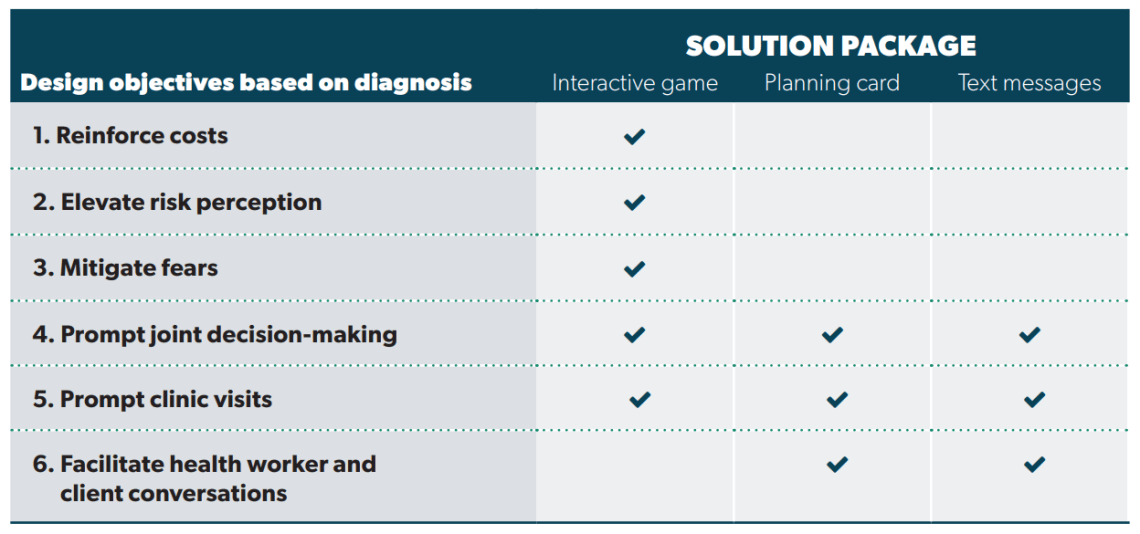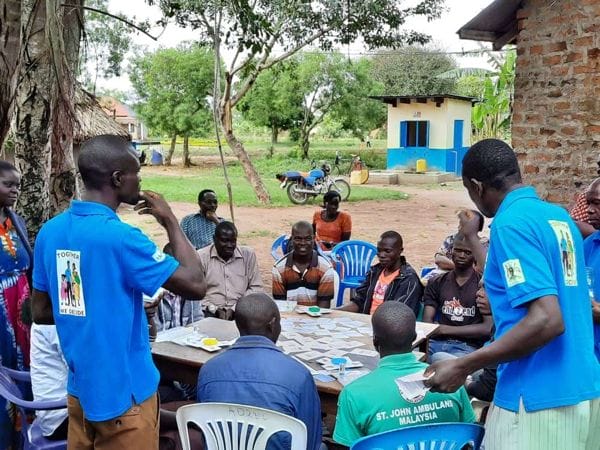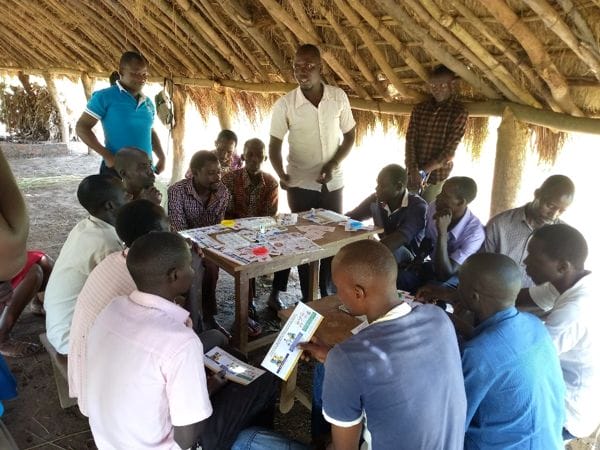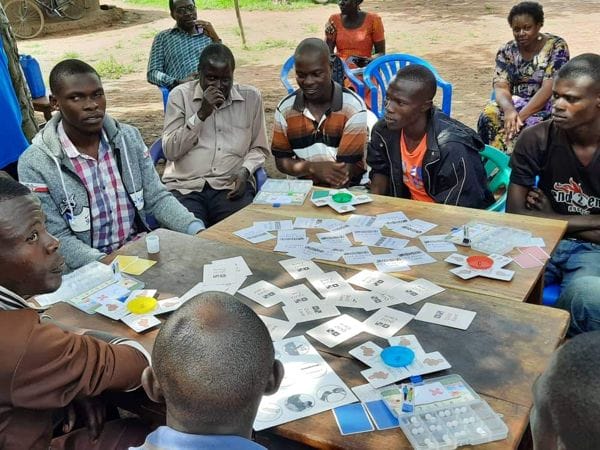Supporting Couples in Uganda to Make Active, Joint Decisions About Childbearing
HIGHLIGHTS
- Men play an important role in family planning decisions but education and outreach programs often fail to engage them effectively.
- Encouraging men to think about family planning in terms that resonate with them, such as the costs of raising a family, may boost their support for using modern contraceptives.
- Modeling discussion and joint decision-making may help ensure that women are empowered to play an active part in choices about contraception.
The Challenge
The timing and spacing of pregnancies are critically important for women’s and children’s health. Closely spaced pregnancies have a higher risk of adverse outcomes, including miscarriage and maternal and newborn death. Closely spaced pregnancies can also strain a family’s financial resources, leading to downstream consequences for the health and wellbeing of all family members. In Eastern Uganda, unintended pregnancies soon after childbirth are common, leaving the health and wellbeing of women and children at risk.
Among Ugandan women who have recently given birth, unmet need for modern contraception is particularly high: 68% of women who are within two years postpartum wish to avoid pregnancy but are not using any modern contraceptive method. The Scale-up & Capacity Building in Behavioral Science to Improve the Uptake of Family Planning & Reproductive Health Services (SupCap) project aims to protect women’s and children’s health by reducing unmet need for modern contraception among postpartum women living in Eastern Uganda. SupCap is a collaboration between ideas42 and IntraHealth International, funded by the William and Flora Hewlett Foundation and implemented in close coordination with the USAID-funded Regional Health Integration to Enhance Services in Eastern Uganda Activity (RHITES-E).
In Eastern Uganda, as in many other settings, men play an important role in decisions about child spacing and contraceptive use but are often left out of education and outreach programs, which primarily target women. Moreover, because men approach these choices differently—with different priorities, assumptions, and preferences—approaches that are effective in improving contraceptive access for women may fail to resonate with their partners.
Recognizing the role that men play in decisions, we knew that engaging them effectively is an important part of increasing women’s access to services. However, bringing men more deeply into the decision-making process may also generate a risk of undermining women’s agency. With this in mind, we sought to engage men in a way that both boosts their support for modern contraceptive use and empowers women as active, joint decision-makers. To further smooth couples’ access to reproductive health services, we then sought to link men and women directly to health workers, and motivated health workers to consistently provide contraceptive counseling to couples visiting a clinic.
Our Approach
Through clinic observations and qualitative interviews with 50 postpartum women, partners of postpartum women, and health workers across three districts—Kapchorwa, Kibuku, and Serere—of Eastern Uganda, we gained insight into individuals’ and couples’ experiences and perspectives about modern contraceptive use.
Based on insights from our qualitative interviews, evidence from previous successful solutions, and input from partners and other stakeholders, we designed a solution package with three distinct components: an interactive game, a child spacing planning card, and text messages. Each of these components were translated into recipients’ local languages.
- “Together We Decide” Game: Men who are partners of postpartum women play an interactive game called “Together We Decide” with a group of peers. The game—facilitated by trained, male, village health team (VHT) workers—offers men opportunities to “experience” the consequences of choices about child spacing and contraceptive use, build familiarity with contraceptive methods, and envision having conversations with their partners and visiting a health clinic for contraceptives.
Men playing the “Together We Decide” game. Photo Credit: SupCap Uganda
- Child Spacing Planning Card: After playing the game, men receive a Child Spacing Planning card and are encouraged to begin a conversation with their partners using this card. The planning card guides them to discuss the number of children they want, the desired spacing of children, and the use of contraceptives.
- Text Messages: Using a sign-in sheet, VHT staff collect mobile numbers from men attending their first game session. After the first session, text messages are sent to men who play the game, the VHT members who facilitate the game, and health workers.
More information on these solutions can be found here.
Results
In February 2020, our team began pilot implementation and a quasi-experimental evaluation of the solution package across three districts in Eastern Uganda. Although rollout of the solution package was interrupted due to the COVID-19 pandemic, we recruited over 650 men in postpartum relationships to play the game and collected enough data—from observations of over 70 game sessions, survey responses from 1,374 men and women in postpartum relationships, and survey responses from 45 health workers—to generate valuable insights. While analysis of the impact of our solution on knowledge, attitudes, and behaviors related to child spacing is underway, early findings on changes that occurred after our solution was implemented offer promising evidence for our approach.
More information on these early findings can be found here.
Takeaway
These initial insights suggest that the solution set was both well received and effective in meeting our design objectives. Through a fun, lighthearted environment, the game allowed participants to tackle sensitive topics, feel the consequences of their choices, and build confidence to engage in sometimes uncomfortable discussions. The planning cards acted as a cue to guide discussions, and text messages reinforced key concepts and reminded men and facility- and community-based health workers that they all can and should begin conversations. Together, the solution components show a new approach to reach men with family planning programming that addresses their unique needs but also leaves space for women to participate actively in choices. They offer a promising means to empower both men and women to “decide together” about their families’ reproductive futures and to reduce unmet need for modern contraceptives during the postpartum period.
Interested in our work applying behavioral science to global health? Email gh@ideas42.org or tweet at @ideas42 to join the conversation.
Partners
















